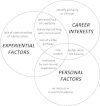Becoming a medical educator: motivation, socialisation and navigation
- PMID: 24885740
- PMCID: PMC4047547
- DOI: 10.1186/1472-6920-14-110
Becoming a medical educator: motivation, socialisation and navigation
Abstract
Background: Despite an increasing concern about a future shortage of medical educators, little published research exists on career choices in medical education nor the impact of specific training posts in medical education (e.g. academic registrar/resident positions). Medical educators at all levels, from both medical and non-medical backgrounds, are crucial for the training of medical students, junior doctors and in continuing professional development. We explored the motivations and experiences of junior doctors considering an education career and undertaking a medical education registrar (MER) post.
Methods: Data were collected through semi-structured interviews with junior doctors and clinicians across Queensland Health. Framework analysis was used to identify themes in the data, based on our defined research questions and the medical education workforce issues prompting the study. We applied socio-cognitive career theory to guide our analysis and to explore the experience of junior doctors in medical education registrar posts as they enter, navigate and fulfil the role.
Results: We identified six key themes in the data: motivation for career choice and wanting to provide better education; personal goals, expectations and the need for self-direction; the influence of role models; defining one's identity; support networks and the need for research as a potential barrier to pursuing a career in/with education. We also identified the similarities and differences between the MERs' experiences to develop a composite of an MER's journey through career choice, experience in role and outcomes.
Conclusions: There is growing interest from junior doctors in pursuing education pathways in a clinical environment. They want to enhance clinical teaching in the hospitals and become specialists with an interest in education, and have no particular interest in research or academia. This has implications for the recruitment and training of the next generation of clinical educators.
Figures
Similar articles
-
Transition experiences of UK junior doctors who leave clinical practice to pursue careers in medical education: a qualitative study.BMJ Open. 2024 Dec 10;14(12):e088615. doi: 10.1136/bmjopen-2024-088615. BMJ Open. 2024. PMID: 39658290 Free PMC article.
-
Building a sustainable rural physician workforce.Med J Aust. 2021 Jul;215 Suppl 1:S5-S33. doi: 10.5694/mja2.51122. Med J Aust. 2021. PMID: 34218436
-
Specialist training aspirations of junior doctors in Sierra Leone: a qualitative follow-up study.BMC Med Educ. 2018 Aug 15;18(1):199. doi: 10.1186/s12909-018-1292-1. BMC Med Educ. 2018. PMID: 30111330 Free PMC article.
-
'Fostering the Future': Exploring Barriers and Enablers to Doctors Pursuing a Clinician Educator Pathway in Obstetrics and Gynaecology.Aust N Z J Obstet Gynaecol. 2025 May 28. doi: 10.1111/ajo.70047. Online ahead of print. Aust N Z J Obstet Gynaecol. 2025. PMID: 40433836 Review.
-
CAEP 2016 Academic Symposium: How to have an impact as an emergency medicine educator and scholar.CJEM. 2017 May;19(S1):S16-S21. doi: 10.1017/cem.2017.339. CJEM. 2017. PMID: 28508742 Review.
Cited by
-
May I see your ID, please? An explorative study of the professional identity of undergraduate medical education leaders.BMC Med Educ. 2017 Feb 1;17(1):29. doi: 10.1186/s12909-017-0860-0. BMC Med Educ. 2017. PMID: 28143476 Free PMC article.
-
Fostering the clinician as teacher: A realist review.Med Educ. 2025 Feb;59(2):151-163. doi: 10.1111/medu.15476. Epub 2024 Jul 21. Med Educ. 2025. PMID: 39034500 Free PMC article. Review.
-
Novice clinician educator professional identity formation through a longitudinal mentorship: a qualitative study.BMC Med Educ. 2024 Oct 28;24(1):1224. doi: 10.1186/s12909-024-06206-3. BMC Med Educ. 2024. PMID: 39468549 Free PMC article.
-
Education Research: Rewarding Our Educators: Design and Evaluation of a Program to Fund Teaching in Neurology.Neurol Educ. 2024 Dec 30;4(1):e200182. doi: 10.1212/NE9.0000000000200182. eCollection 2025 Mar. Neurol Educ. 2024. PMID: 39744617 Free PMC article.
-
An analysis of the challenges in recruiting clinical teachers in Iranian medical universities: A qualitative analysis.J Educ Health Promot. 2021 May 20;10:147. doi: 10.4103/jehp.jehp_876_20. eCollection 2021. J Educ Health Promot. 2021. PMID: 34222522 Free PMC article.
References
-
- Hu WCY, McColl GJ, Thistlethwaite JE, Schuwirth LWT, Wilkinson T. Where is the next generation of medical educators? MJA. 2013;198(1):8–9. - PubMed
-
- Foundation Programme Office UK. Compendium of Academic Competencies. London: UKFPO; 2009.
-
- The Confederation of Postgraduate Medical Councils Website. http://curriculum.cpmec.org.au/professionalism.cfm.
-
- UK Clinical Research Collaboration. Medically- and dentally-qualified academic staff: recommendations for training the researchers and educators of the future. Report of the Academic Careers Sub-committee of the Modernising Medical Careers and the UK Clinical Research Collaboration. London: Modernising Medical Careers; 2005.
MeSH terms
LinkOut - more resources
Full Text Sources
Other Literature Sources
Miscellaneous


